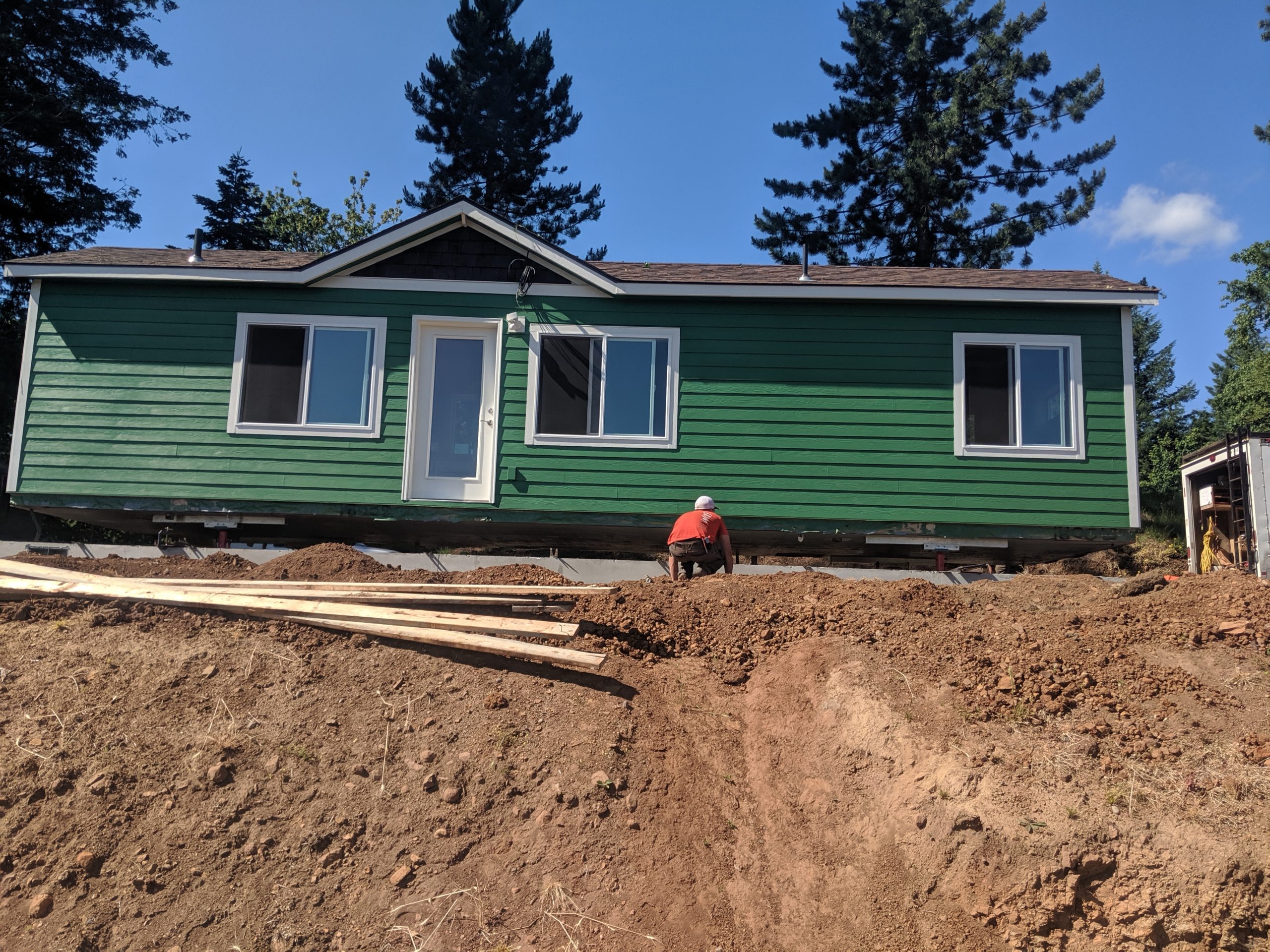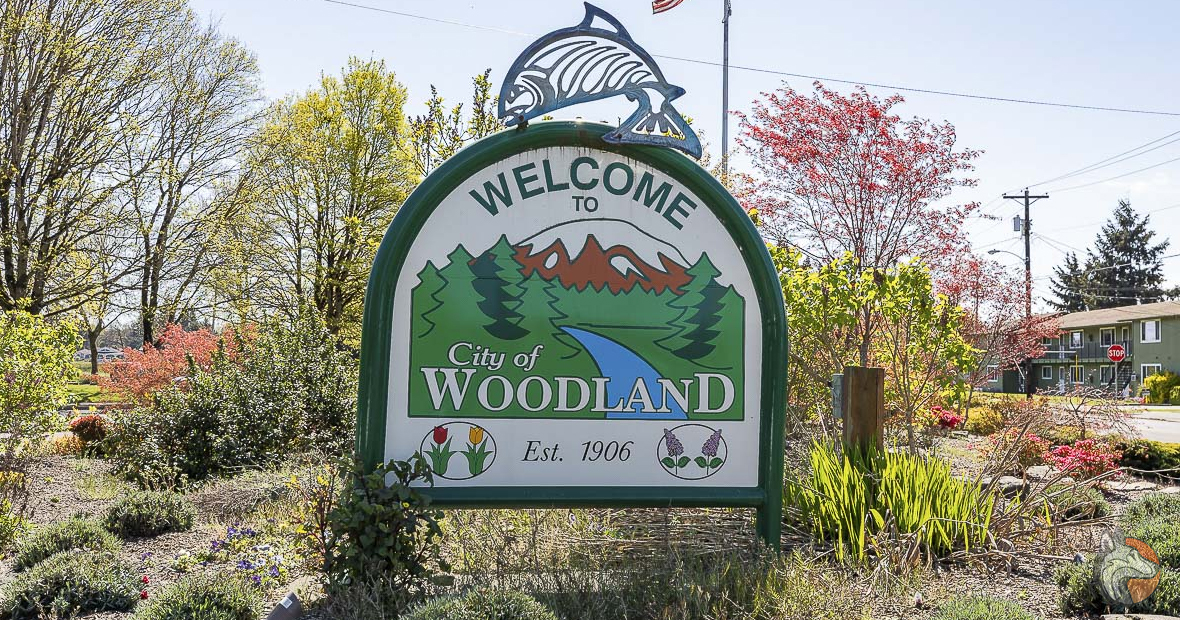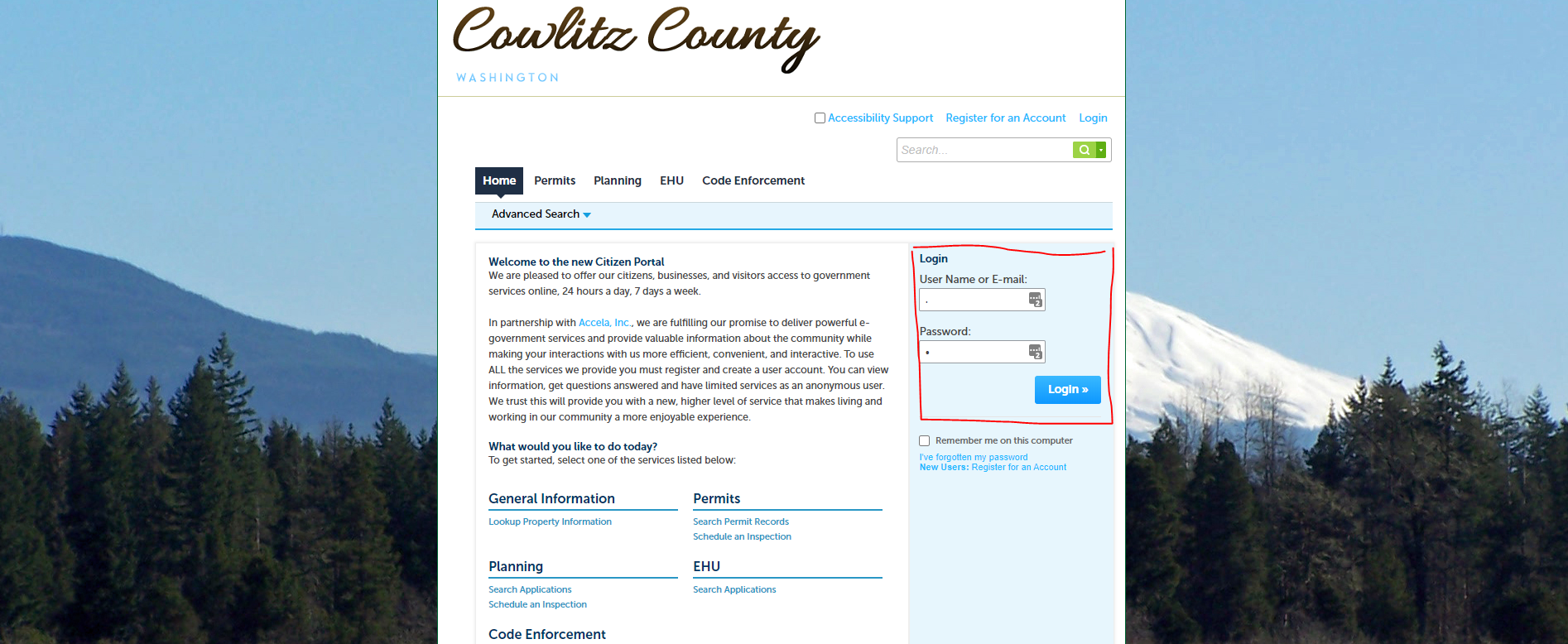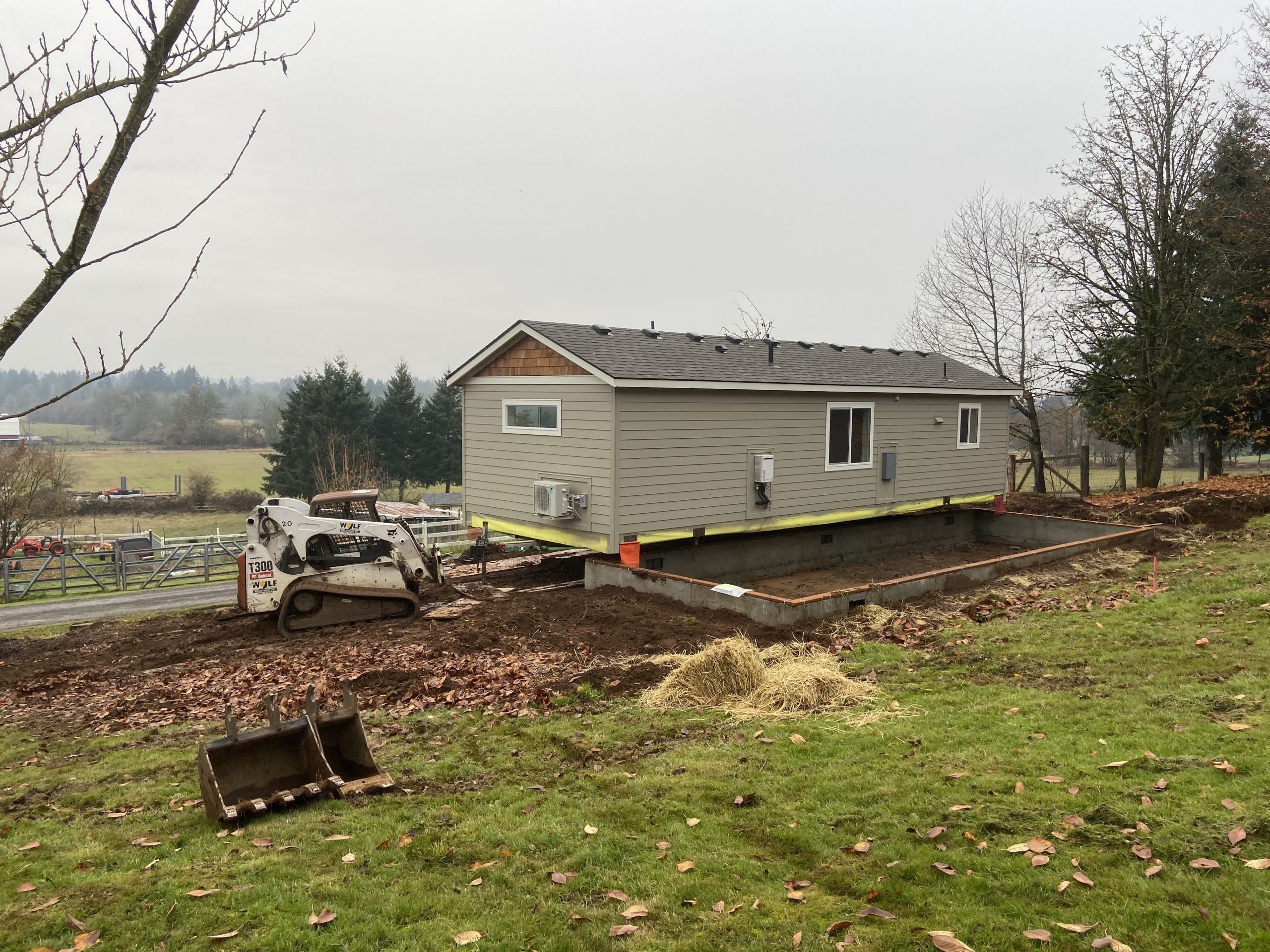Making the most of your property
Do you have a loved one who needs assistance you’d like to move onto your property? Maybe you’re looking into investment properties as an opportunity to make some extra money each month? Maybe you’d prefer to rent your main home, and like the idea of simplifying your life by moving into a smaller space?

For property owners both rural and urban, there are many reasons to consider a tiny home or accessory dwelling unit.
- Most urban lots within city limits have enough room for a small tiny home to be placed as ADUs, or otherwise known as an accessory dwelling unit.
- In the City of Woodland, they can be used as a long-term rental property where zoning allows. The additional dwelling unit allows you to collect income on your investment.
- Tiny homes provide the opportunity to have family members live in close proximity while maintaining a level of privacy for everyone.
- Tiny homes can relieve a burden from you by giving you less to care for. This can save you time, money and a lot of physical labor.
- Having a smaller living space allows you to simplify your life and declutter your home.
- Tiny homes can be energy efficient. Your monthly expenses will decrease, and you get to play a part in caring for our environment.
Typically, tiny homes are built in a shop with a factory like assembly. This type of home, constructed off-site, is called a modular home. Compared to manufactured homes, a modular home still meets traditional stick-built standards and does not use low-quality materials or engineering workarounds to keep it’s structural integrity.
This building process is more efficient and cost effective than building onsite. Because the homes are built faster and more efficiently, the builder can pass the savings on to you.

A closer look at rules and regulations
Like all jurisdictions, the first step in applying for your permit should always be doing your research. It’s important to determine if the project you’re dreaming of is permittable. The first step is to determine the jurisdiction your property is in. Each jurisdiction has their own codes, rules and regulations that differ one from another.
The City of Woodland is unique because your property could fall within one of three different jurisdictions: Clark County, Cowlitz County or the City of Woodland.
You can determine your jurisdiction and find details regarding your zoning and code by visiting the Clark County Property Information Center or the Cowlitz County Building Departments information website
Clark County
If your property has a Woodland address and is in Clark County, your building jurisdiction will be Clark County.
You’ll need comply with the Clark County code and apply for your ADU permits with the Clark County Building Department.
It is important to note that because of Covid-19 the Clark County Building Department is not accepting in person requests, beginning March 18th 2020. The entire application process is being handled through the land management system.
City of Woodland
If your Woodland address is in Cowlitz County, it could fall under either the Cowlitz County or City of Woodland jurisdiction.
If you have an urban zoned property, you’ll apply for your permits at the City of Woodland Building Department. Their address is:
City of Woodland Building Department
230 Davidson Ave
Woodland, Washington 98674
In high density areas, the distance between buildings and the property boundries tends to be more relaxed.
Cowlitz County
If you have a rural zoned property, you’ll apply for permits with the Cowlitz County Building Department. They are located at:
Cowlitz County Building Department
207 4th Ave N.
Kelso, WA 98626
Addresses that report to either Woodland proper or the county will both have information available online through the county website previously provided.

Applying for a building permit
When applying for a building permit you’ll need to have a plot plan of your property with the proposed location of your accessory dwelling unit, application forms and your construction plans.
You’ll need to contact your jurisdiction’s building department to determine if your project is permittable and what their specific requirements are. You can find more detailed information on permitting in Woodland in our permit guide.
Residents can also contact the city via mail at their official mailing address at City of Woodland, 230 Davidson Ave P.O. Box 9 Woodland, Washington 98674.
Using a third-party service or consultant
Many times property owners will find the permitting process to be overwhelming and instead may prefer to let a local expert handle the paperwork and legal criteria.
We are happy to provide a complimentary 60-minute consultation if you’re interested in a modular unit. In this appointment we’ll help you determine the feasibility of your project and if it fits within your budget, as well as help you become familiarized with what your legal obligations are.
Our experts will help you select the tiny home model that best meets your needs. Each model has a base price with optional upgrades.
Once you’ve selected your model with options, we’ll calculate your estimated cost of your accessory dwelling unit project.
Existing tiny homes in the City of Woodland
There are other potential costs to take into consideration. These can include permitting fees, utility connections, and the cost of additional work that may be required to complete your project. Additional work may include environmental reports, grading and excavation, installation of driveways, decks or covered patios. These additional costs will vary and can range from $10,000 to $18,000.
If you choose to use our application services, we collect a deposit of $4500. This deposit will cover the costs associated with jurisdiction fees and the labor required to obtain your permits.
If your permitting fees were to exceed the $4500 deposit, you would be responsible to pay the remaining balance of the fees associated to permit your home. Typically, this doesn’t happen in the City of Woodland unless you’re paying system development charges fees for the first single family residence placed on the property.
Woodland property owners within the City of Woodland jurisdiction can expect their accessory dwelling unit permit fees to be under $4,000.
As outlined above, let’s say the cost of your structure is $112,602.60 including sales tax. The permitting fees for an ADU in the City of Woodland typically run between $600-700. The city also has impact fees for the school district and transportation of roughly $2,520, making your total roughly $3,220.

The house itself is inspected and signed off at the state level through L&I’s Factory Assembled Structures program, allowing lower costs of permitting. This helps make your permitting fees at the local jurisdiction less than if you were to build a structure onsite, saving money.
For the sake of this post, we’ll assume your permitting fees are $3,220. This total is included in the fee estimate above in the permit, foundation and delivery line.
It is important to remember that any additional requirements triggered by your property’s specific needs may create costs that vary from the estimated costs listed above.
Examples of these potential additional cost could include environmental reports, arborist reports or geotechnical reports. We’re happy to help you determine the estimated expense you may incur with your project. If you’d like to explore your options and get a budget for your project, you can schedule a consultation.
Set up of modular tiny homes
When your tiny home’s construction is complete, we’ll contact you to schedule a walk-through of your new home. Once your walk through is done and we have your approval, we’ll collect the remainder of your outstanding balance and the house will be yours!
During the time the house remains at our shop location, travels to the site and gets setup, it will remain insured by the builder.
When we have your building permit in hand, we’ll be ready to schedule our first visit to your site to begin the grading and foundation work.
Our on-site crew will arrive to your property to grade your building site and install the foundation. When the foundation is complete, the house is delivered to the foundation and the utilities are connected. Once the installation of the home is done, your home will be thoroughly cleaned, and a meeting will be scheduled to hand off your keys.
All documents related to your new home will be left with the home for your records and your warranty begins. This process typically takes 2-5 weeks.
Next steps as a tiny home owner
With your project finally complete and your tiny house placed, you won’t need to labor over maintaining a large home anymore. No more 2nd story windows to clean, dangerous roofs to repair, or other back breaking maintenance. No more spending your weekends on “to do” lists. It’s time to enjoy the savings of your lower mortgage payment, and utility bills.
This new margin in your budget and schedule will allow you to spend your time and money on the “fun stuff” or allow you to save for your future dreams.
If your tiny home is an investment property, get ready to enjoy some additional income and the assurance of having a long-term investment!
As of February 2020 the average 1-bedroom apartment rent in Woodland, WA is $1,111, so start collecting some rent and enjoy your additional income with a new Wolf Industries tiny home accessory dwelling unit.
If you’re moving a family member onto your property, now you can enjoy the convenience of having your loved one at your fingertips. No need to make a special trip across town to get them the help they need. No more worry about their safety from afar. Now you can enjoy the peace of mind that comes with having your loved one close to you, literally in your own back yard.
Leave A Comment